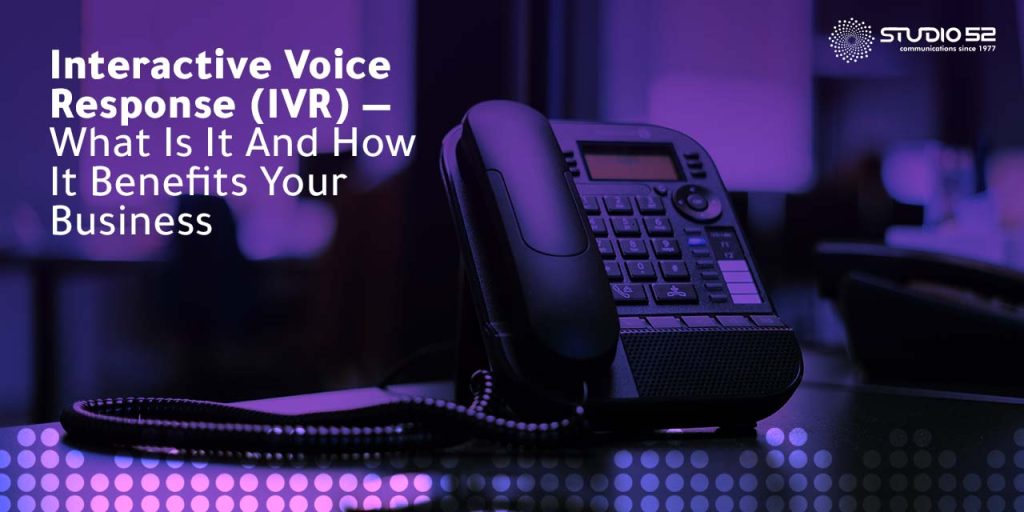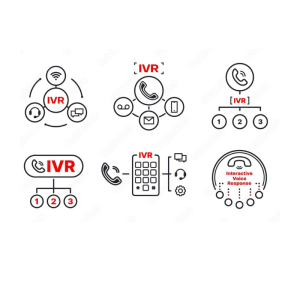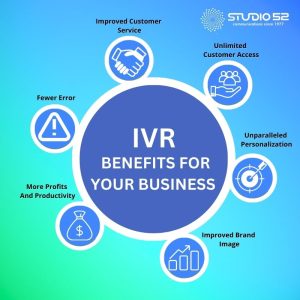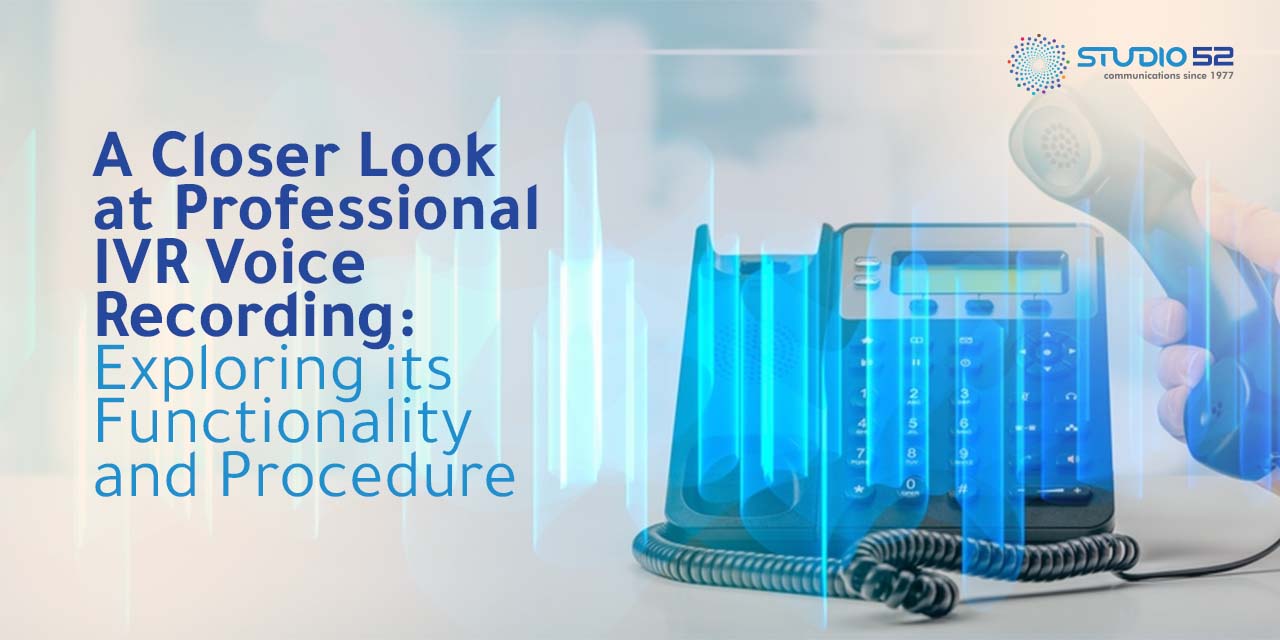We have all been there — calling for our mobile operator, and all agents are currently busy. Suddenly a recorded message lets us know that they appreciate the call and notifies us of where we are in the line to be accepted on a call by an operator. What if this audio-recorded message allows us to interact with it by pushing numbers and reaching a solution?
Then this is called an interactive voice response or an IVR! Okay, a simple definition we know, so let’s get a little deeper and see how the thing works and help you determine if it’s the perfect solution for your business!
Table of Content
What Is IVR And How Does It Work?
IVR is a telephone system that practically lets your customers interact with a voice system, without the need to talk to an agent in person over the phone!
Studio52 delivers IVR recordings in the exact formats your phone systems need. Our team knows that different phone systems require specific audio types and settings. We make sure the recordings fit perfectly so they work without problems. This helps your IVR system run smoothly and gives callers a good experience. By providing the right formats, we save you time and effort, making it easy to set up your phone system with clear, professional recordings. This system has basic step-by-step interaction with the caller and guides them to the desired destination.
It’s an efficient way of call routing to the appropriate recipient, information spot, or agent — all based on the needs of the caller. The callers are presented with a series of menus they can go to and finish at the exact spot they need. They interact with the IVR system by their phone keypad or voice input!
Sometimes, the output can even be an SMS message, or an email and not necessarily an agent or a specific prerecorded audio message.
A recent study found that 69% of respondents said they successfully resolved their issue completely with an IVR!
- Basics
IVR is a form of computer-telephony integration that’s incorporated into your contact center. Essentially this is your digital call agent, here for anything that can be resolved without the need for human intervention. The end-user is able to navigate through your contact center and reach their solution quickly and efficiently. This way you essentially enable the customer to route their call to the appropriate specialized station in your call center.
From a technical point of view, this system consists of tech equipment, software applications, a database, and supporting infrastructure. You’ll need a stable internet network within your business, a real-time updated database that the IVR system can access, and a web application to host your IVR system software.
69% of customers discover that IVR solutions quickly put a stop to their quest. Give your customers 24/7 support with Studio 52’s IVR services.
- Mapping And Testing Your IVR
Before you can implement an IVR into your call center, you’ll need to map it out. This essentially means creating a script for your IVR service that will contain a specific set of interactions and anything else defined that troubles any given caller.
A typical IVR system may be mapped out like this:
- Welcome message personalized on callers name (if you’ve allowed your IVR access to the database)
- Language option (Choose “one” for English, “two” for Italian, etc)
- Menu for any given service or department that the customer may need
- Music on hold, announcements, and prerecorded messages can help them troubleshoot and resolve basic issues
- Options to redirect themselves to on-call agents
Once you have your IVR system mapped out, it’s time to give it a test before the final implementation and launch. Usually, you’d want to verify that the customer identity system works, test every possible call routing option, and if it leads to the appropriate spot. Lastly, you’d want to verify that the entire system looks as you imagined or if any things can be tweaked or improved.
Also Read: THM – Hotel Telephone Hold Music & Messages
Evaluating Your Needs
Before any company begins even getting lost in the entire list of features and benefits of IVR systems, or even technicalities there’s a question of whether you even need this system or not.
Do You Even Need IVR
As we’ve mentioned the IVR reduces the need for customers to interact with an agent on call. Your agents are thus allowed to address more complicated issues and simple queries are left with an IVR. IVR enables you to automate workflows making you more efficient!
However, if you have a very low inbound call volume, and you’re practically able to receive calls yourself, you may want to invest your money in different areas. However, if there’s a way to improve the call routing system of any call center, it’s with the use of an interactive voice response system.
What Type Of IVR Do You Need
There are several ways in which IVR can help your business out, and there are two main ways you should consider!
First is smart call routing, as we’ve largely explained in this article. Here, the IVR is your first level of interaction which allows the customer to resolve their query before even needing to talk to an agent.
Another way in which IVR can help you out is sales — IVR is awesome at conducting feedback surveys and improving your sales. IVR uses prerecorded messages and these messages can include sales and promotional messages that can leave customers wanting something more from what you offer.
Avoid repetitive queries with custom IVRs and free up your agents to deal with more difficult problems. Enhance productivity with Studio 52’s IVR Service !
IVR Benefits For Your Business
IVR is a perfect way into getting personal with every customer. However, it can benefit your entire business in more than one area!
- Improved Customer Service
Your business cannot make do without customers. You need to always maintain a healthy and happy database of happy customers or clients. IVR provides efficient problem solutions for your customers, making them feel like they matter and that you care to resolve their issues quickly and with care!
- Unlimited Customer Access
While humans can interact and work with customers at specific times of the day, your IVR system is always at your disposal. If your customer needs something answered in 2 in the morning, you can be sure that they’ll get the answer then, or that the agent will get notified to give them a call back when they’re back at work!
- Unparalleled Personalization
Your customers love it when you call them by their name, instead of feeling like just a number. IVR tech has gone so far that it can now access your databases and connect the caller’s phone number with the caller ID (ie. name) and insert the caller’s name inside the prerecorded messages. Moreover, it allows customers to interact with it in more than a single language which comes as a plus.
- Improved Brand Image
IVR creates an image like you’re a company that’s going places and is constantly growing! This gives your customers the confidence that they’ve chosen the right operator for the service or product they’ve purchased and you’re likely to get recommended as a result.
- More Profits And Productivity
Huge amounts of business transactions and talks still happen on the phone! IVR helps you get more calls resolved and acts as both your front desk and an operator that can close deals. This saves your company money and time and makes you even more productive in turn!
- Fewer Errors
Call center agents to get tired when they have to deal with heaps of phone calls, sometimes the ones that can be resolved easily through an IVR. Having an IVR in place helps your agents deal with issues that they really should, making them more focused, balanced, and less error-prone in the process!
Conclusion
Not all customers are the same, and some will still like to resolve their issues by actually talking to an agent. However, having an IVR in place you’ll even help these customers reach a desired place more efficiently! Meaning that this system is a win-win, and it ensures a stellar customer experience. The only thing is to decide if you need it based on your business and amount of calls you receive!
Ready to make IVR happen? Studio52 can help you out!







